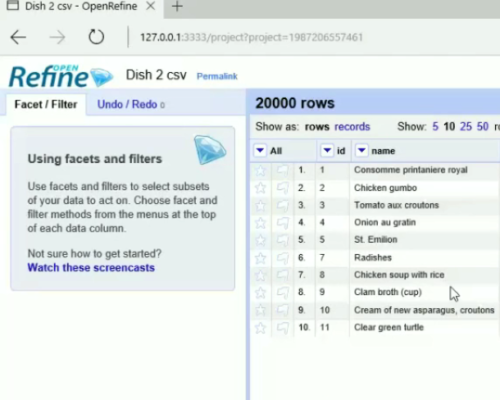Sara Sheer Event Review Summary: Professor Robert Englund of the Cuneiform Digital Library Initiative (CDLI) gave a lecture on the digitization of cuneiform texts. He described how the tablets had been scanned, then transcribed, translated, transliterated and annotated into machine-readable-code. This data was then organized into databases for the benefit of researchers. The geographic dispersal of cuneiform texts and…
Category: Resources
Introduction to OpenRefine
This tutorial (recorded using SnagIt) is intended to introduce users to OpenRefine, its basic features, and to act as a springboard for a digital humanities project/study that involves great quantities of data. The dataset used in this Skillshare was generated from New York Public Library’s (NYPL’s) crowdsourcing project What’s on the Menu?, where members of the public transcribed menu items from the 1840s to the present. Cleaning datasets is often the first step that needs to be taken when using public datasets, as they are typically messy, and OpenRefine can help users accomplish large-scale data cleaning (and data manipulation).
Overall, this Skillshare intends to introduce users to basic features of OpenRefine in order to make datasets more discernable (particularly for digital humanists who often use public humanities datasets), readying them for further analysis.
“Specialization and Diversity in Dutch and Flemish Printmaking,” a lecture by Matthew Lincoln, The Frick Collection, April 7, 2016
In his lecture “Specialization and Diversity in Dutch and Flemish Printmaking: A Computational Approach,” PhD candidate Matthew Lincoln explored two separate but related questions pertaining to sixteenth- and seventeenth-century Dutch and Flemish printmaking and painting. As part of the Frick Collection’s Digital Art History Lab lecture series, both parts of the lecture addressed how the study of art history can…
“Immersive Narratives: Advertising, Engagement, and Storytelling,” Panel Presented by CUNY
The Immersive Narratives: Advertising, Engagement, and Storytelling panel was held at Baruch’s Performing Arts Center on Thursday, April 7, 2016. It featured three panelists—two from within the advertising industry, and one media professor. At the heart of the presentations and discussions was the concept of immersion and participation in media—how viewers and consumers are no longer just passive audience members.…
Open Source, Web-Based Teaching and the Digital Humanities: “Critical Approaches to Teaching With Web-based Technologies,” Workshop Provided by CUNY Teaching & Learning Center
EVENT IN BRIEF The workshop “Critical Approaches to Teaching With Web-based Technologies,” run by Andrew G. McKinney of the CUNY Graduate Center’s Teaching & Learning Center, centered around the exploration and implementation of non-proprietary, web technologies for educational purposes. We discussed important technologies, resources, and concepts such as WordPress, blogs, digital assignment hybridization, educational crowdsourcing, and online community engagement, as well…
“At The Edge of the Network: Undersea Cables and Deep Infrastructure”, a presentation by Nicole Starosielski for CUNY Graduate Center
At this CUNY Graduate Center event, digital humanist Nicole Starosielski discussed her recent book The Undersea Network and the GIS project that she developed alongside it. The project, Surfacing.in, comprises a network of annotated cable landing locations in a manner that allows a user to explore the way signals travel throughout the network of cables that run through and around the Pacific ocean. In addition to demonstrating the project, Starosielski discussed constructing network layers and edges, displaying cultural context in a dynamic mapping context, and the role that ecological identity can play in the development of information networks.
Protected: Social Media Scraping for Qualitative Research with Sarah DeMott, New York University, February 11, 2016
There is no excerpt because this is a protected post.
NYCDH Week: Pinterest
The Digital Humanitiesʼ resources and projects may be displayed and promoted to the wider community with the use of a wide variety of technological tools. Pinterest becomes a very convenient and accessible option because, on the one hand, it provides a series of “boards” that function as exhibition areas that support the display of projects, books, films, exhibits, conferences, lectures and competitions related to the DH field; and, on the other hand, it encourages the tagging of all these resources with “pins” in order to interconnect them with the wider world.
Ms. Whsyel expressed that Pinterest is an important technology tool for the DH community because it provides an opportunity to showcase exhibitions within a high traffic environment. Noreen Whyselʼs event Pinterest as Exhibition Gallery included a one-hour introductory explanation followed by a one-hour of workshop for all its participants.
Basics of Statistical Literacy: an Event Review (NYCC DH Week)
As part of the NYC Digital Humanities Week Spring 2016 festival, Dr. Irene Lopatovska lead a session titled, “Understanding Numbers: Basics of Statistical Literacy” at Pratt’s Manhattan campus. After an introduction to four types of numeric data scales, types of statistical analyses were reviewed in terms of their applicability to the numeric scale types. These analyses included measures of central tendency, dispersion, standard deviation, and more. Throughout the overview, examples were given in excel. Dr. Lopatovska also provided a brief overview of inferential statistics, which can be studied further in her class “Data Analysis and Publication”.
“Typography for [Digital] Humanists” Amy Papaelias, NYCDH Week 2016 Fordham University, February 12
“Typography for [Digital] Humanists” was a workshop lead by Amy Papaelias, Assistant Professor of Graphic Design at SUNY New Paltz. Her workshop, presented during NYCDH Week 2016 at Fordham University, focused on basic typographic design principles and how they can be applied to digital humanities projects. The workshop also explored various typography resources available online, including Typecast.com, and the challenges and concerns digital humanists might face when trying to apply typographic principles to their projects. With the increase in research and projects, digital humanists will have to find ways to stand out, and typography seems to be a great place to start.
